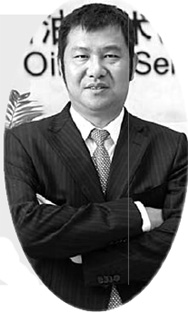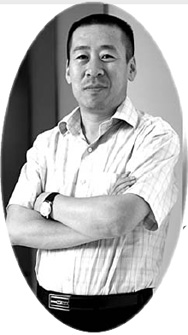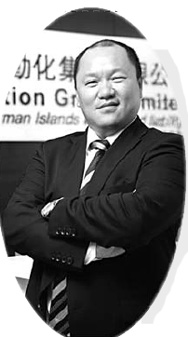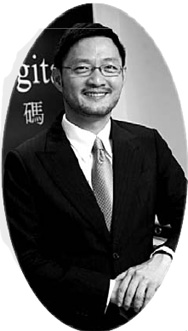Top Biz News
2009 'Entrepreneur of the Year' awards
(China Daily)
Updated: 2009-11-03 08:25
Luo Lin, chairman of the Board of Anton Oilfield Services Group. Emerging Entrepreneur Of The Year Category Winner

After gaining valuable experience in the oil industry at Sinopec and PetroChina, Luo Lin used his savings to start his own business in 1999. The company, Anton Oilfield Services, became the first privately-owned Chinese oilfield services company to be publicly traded, listing in Hong Kong in 2007.
Anton provides technical support and assistance to major Chinese oil companies. Services include the provision of drilling equipment, sand control services and well-cementing services.
The company's business covers most of China's oil producing areas, including Daqing, Sichuan, Dagang, Shengli and Nanyang. The company has been growing fast. Revenue has tripled between 2006 and 2008, and, sensing opportunities in the downturn, Anton bought two companies to expand and diversify the business. Looking beyond its own borders, it has set up an overseas entity in Dubai in order to explore new opportunities in developing countries.
Q: What does it cost to be a successful entrepreneur?
A: Not only an entrepreneur, but every successful person has to pay a lot for their achievements. For me, the cost of being an entrepreneur is that you cannot excel in other fields at the same time, such as being a politician, an artist or an educator. You have to give up many of your childhood dreams and commit yourself to being an entrepreneur. It is a shame, but it is a choice I had to make.
Q: In your opinion, how can we enhance support for entrepreneurs?
A: I think that entrepreneurs, especially Chinese entrepreneurs, are very willing to support the continued and accelerated process of China's reform and opening up program, which will provide a more favorable environment for their development. Direct support doesn't mean much. It is better to offer freedom to operate for entrepreneurs without interference and let them become genuine entrepreneurs, not politicians or whatever else.
Q: Would you like to share some of your most valuable experiences gained whilst starting your business?
A: Firstly, one should be fully prepared before starting a business. Before starting my own company, I worked in several State-owned enterprises, which helped me a lot. This work experience enabled me to know more about the oil industry and provided me with professional training.
A systematic stock of knowledge is very important and anyone who wants to start a business must be a good learner.
Another lesson I learnt is that you don't need to become friends with everyone, but you can make him or her trust in you. The interrelationship among staff is crucial to the operation of a company. I always stick to one idea - you can be successful by helping others to succeed.
Lu Wenbing, chief executive officer of Inner Mongolia Little Sheep Catering Chain Co. Services Category Winner

Lu Wenbing is one of the founding shareholders of Little Sheep and joined its management in 2004. Little Sheep operates a hot pot restaurant chain, comprising 127 self-owned restaurants and 248 franchise outlets as of 2008. Revenue increased by 35 percent on average from 2006 to 2008.
His key achievements include consolidating the franchise operations to strengthen the quality and service of the franchise outlets, unifying the brand image, improving the management and operational aspects of the business, and making the company more efficient and competitive. He has steered the company to become the first Chinese hot pot restaurant chain to list in Hong Kong, and has helped the company win a variety of international awards, including a number for franchising and brand development.
Little Sheep has contributed significantly to the economic development of Inner Mongolia and has improved the social standing of its agriculture and animal husbandry industries. As a result, demand for lamb has increased and prices have surged, helping improve agricultural livelihoods.
Q: Would you like to share some of the experiences you have gained whilst operating your business?
A: The most precious experience is the realization that you must continue to study, which is necessary for anyone who wants to be successful. As for running a company, I believe that firstly, the character of an entrepreneur decides the future of a company; secondly, the permanent priority for a company is to discover the needs of customers and to satisfy them; thirdly, a good team is a must for a successful company.
Q: What is the lesson you have learnt from the economic crisis? What kind of changes do you think the business world needs?
A: The crisis could have been avoided had the business world adhered to the following principles - avoid greed, enhance rationality and promote integrity.
Q: What are the events you feel most proud of in the history of your company?
A: There are two points I believe to be very important and worth thinking about.
First, in June 2006, we successfully secured overseas investment. Throughout the whole process, foreign investors investigated the financial and legal affairs of our company. It was like a huge exam for us. Finally we passed the exam, which has established a solid foundation for our future growth.
Another milestone was June 12, 2008, when our company was listed on the Hong Kong bourse. After that, we have established an international platform to attract funds as well as skilled personnel. It has also demonstrated our competitiveness in the catering industry.

Richard Xuan, executive director and chairman of the China Automation Group Ltd. Technology Category Winner
Richard Xuan started the China Automation Group in 1996 with 200,000 yuan of his own savings. Listed in Hong Kong, the company is now a leading provider of automation safety and critical-control systems for the petrochemical and railway signaling industries on the Chinese mainland.
China Automation competes with Honeywell and General Electric in China. Its customers include nearly all the top petrochemical and railway companies in the country. It has 72 percent market share of automation safety systems in China's petrochemical industry. It has also diversified into providing safety systems for railway signaling, where it has a 30 percent market share in China.
China Automation has global ambitions. It has opened an office in Singapore to access the export market. In 2007 it bought a Texas-based turbo machinery company, and is now looking to open offices in Japan and Dubai. The company was added as a constituent stock in the MSCI World Small Cap Index in May 2009.
Q: Would you like to share some of your most valuable experiences in operating a business?
A: Doing business is a tough job. I have three points to make. First, you must have great ambitions. Our generation was taught to regard the prosperity of the world as our own responsibility. Secondly, you must have strong will power. Starting a business can be very arduous. It's just like fumbling in the dark. You need perseverance to carry on. Thirdly, responsibility is the ultimate key to success. It's not only an obligation to your own career; it's also the obligation to your clients and your employees, as well as to society.
Q: What do you think the government should do to strengthen support for entrepreneurs?
A: Chinese enterprises are often criticized for their weakness in research and development (R&D). I think it's important for the government to support companies in terms of investment in R&D.
Many domestic companies have to integrate and enlarge their scale in order to raise their standing in the international market. The Chinese government should support mergers and restructuring in certain industries in order to develop their competitiveness.
In addition, the government should maintain a supportive attitude to investment, both from at home and abroad. Investment is a crucial driving force for the economic growth of a developing country.
Q: What are your future plans?
A: We have become much busier since the company was listed in Hong Kong in 2007. Our sales volume quadrupled in three years. This rapid growth is just part of the development of China's automation industry. We will strive to move on towards our goal and try to take our place in the global automation market.
Jack Lau, chairman and chief executive officer of Perception Digital Group. Emerging Entrepreneur Of The Year Category Winner

Dr. Jack Lau started Perception Digital (PD) with two other professors under the Hong Kong University of Science and Technology Entrepreneurship Program (the HKUST Program). PD provides firmware and turnkey solutions for consumer electronic devices.
PD is the largest spin-off from the HKUST Program in terms of the number of staff, which currently stands at 237. Since 2003, PD has sold over 4 million units of leading-edge consumer electronic devices utilizing PD technology, including MP3 players, smartphones, high memory USB thumb drives, digital TVs and wellness and fitness products. These products are sold to global electronics brands including Philips, RadioShack, Verbatim and Imation.
PD is strong on innovation and has filed 39 patents to date. It is one of the few Hong Kong based technology companies that licenses its patents for use by international brands.
A: During the whole process of starting our business, several students of mine - now employed as engineers by the company - and myself developed the technology, pioneered in our university lab, into mature products. We now also promote these products in the international markets. I think this is a very precious experience for me, as someone who used to be a teacher in the Hong Kong University of Science and Technology and who is now a businessman.
Q: What achievements in the history of the Perception Digital Group have made you feel most proud of your company?
A: The most commendable thing is that we have not only commercialized our research findings, but have also obtained a number of patents that are difficult to secure. Our patents have ensured our leading position, well ahead of our competitors. Unlike in universities, we have to create a competitive product rather than merely prove theories and publish papers. We succeeded after 10 year's effort and now our products are accepted by more and more international companies.
Q: What do you think are the costs of being a successful entrepreneur?
A: The most important thing about being a successful entrepreneur is not to ask what you will be paid, but to ask what you can undertake. I have learned one lesson over the past years - instead of asking what I will receive in monetary terms, I am more concerned about what I can contribute to my company.
Q: What is your advice to young people who want to start their own businesses?
A: You should really like what you are doing. Money shouldn't be the only motivation, otherwise you will soon lose interest. Secondly, focus on the things you like because it often takes a long time for a company to grow.















